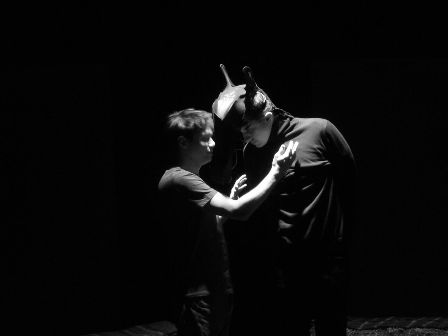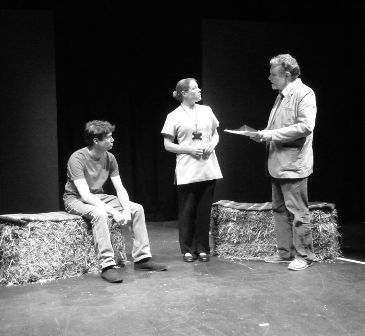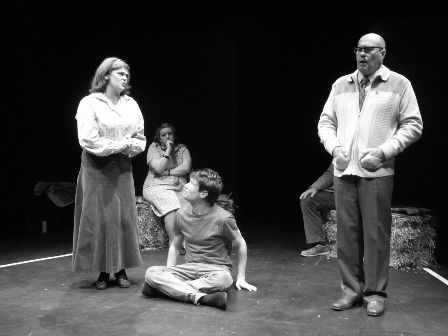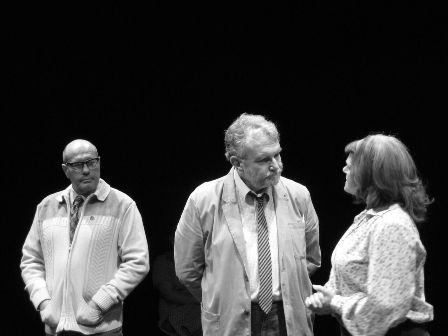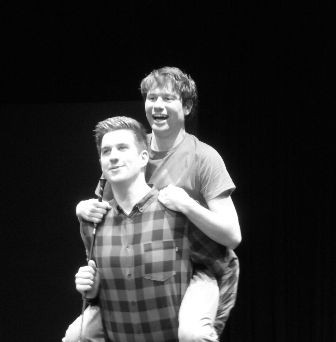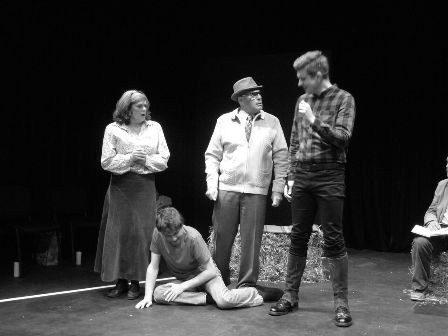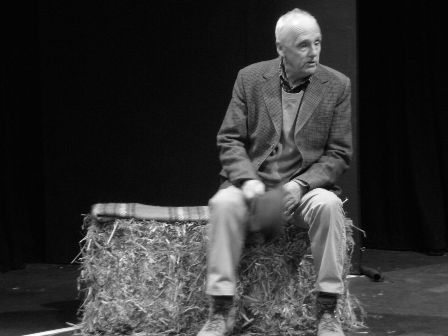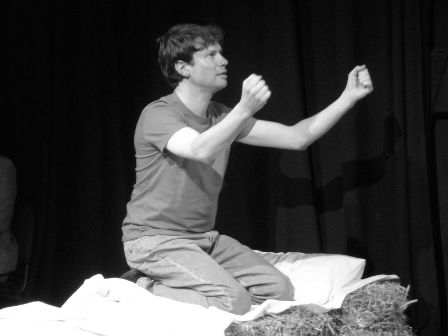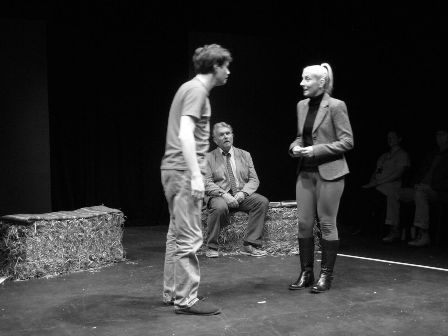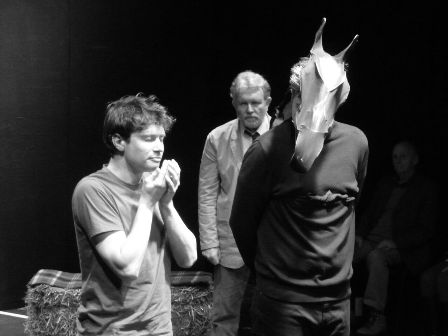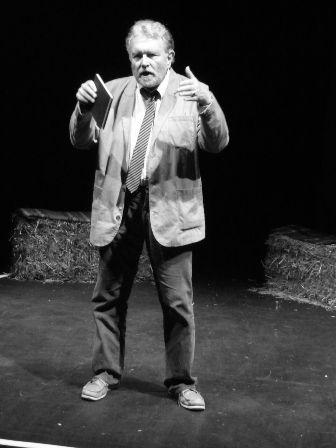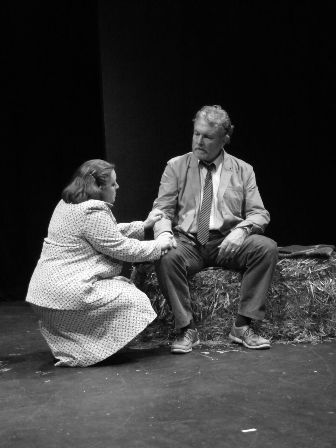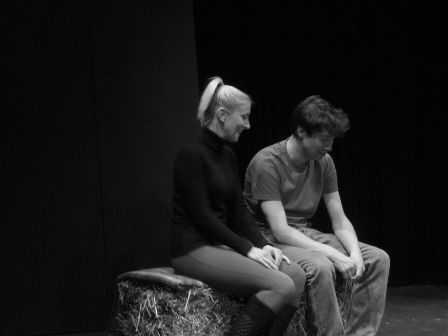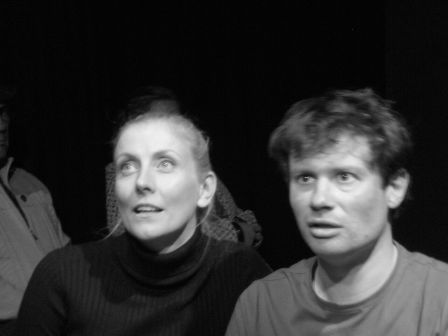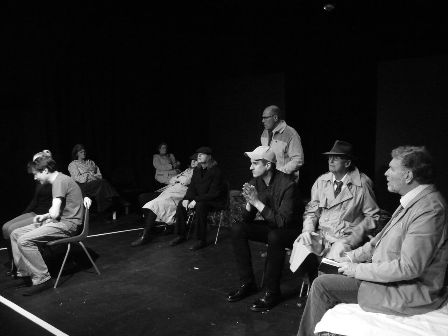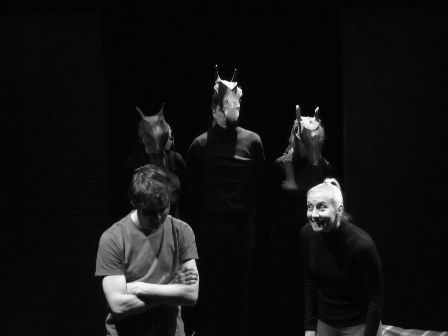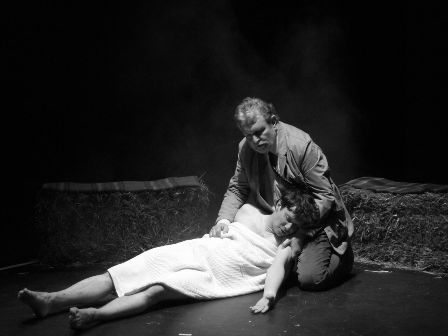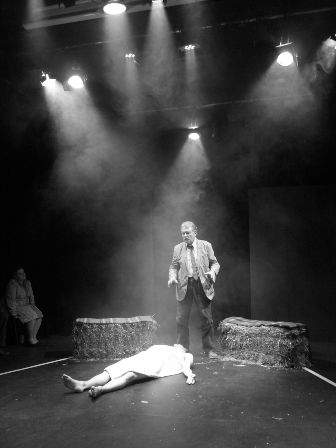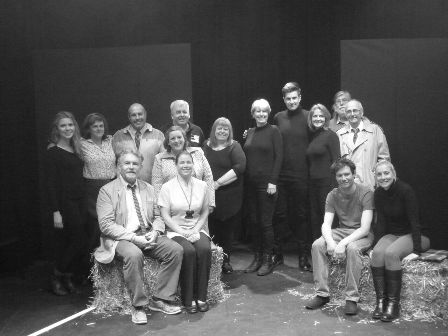The Bench Production
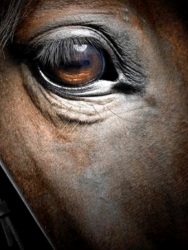
This play was staged at The Spring Arts and Heritage Centre (formerly Havant Arts Centre), East Street Havant - Bench Theatre's home since 1977.
Cast
| Martin Dysart | David Penrose |
| Nurse | Claire Lyne |
| Hesther Salomon | Lorraine Stone |
| Alan Strang | Jeff Bone |
| Frank Strang | Allan Jolly |
| Dora Strang | Megan Green |
| Young Horseman | Craig Parker |
| Harry Dalton | Pete Woodward |
| Jill Mason | Leigh Cunningham |
| Nugget | Craig Parker |
| Horse 2 | Sally Hartley |
| Horse 3 | Ceri Tipler |
Crew
| Director | Alan Ward |
| Producers | Alan Ward and Marion Ward |
| Stage Manager | Marion Ward |
| Assistant Stage Manager | Tasmin Halford |
| Lighting Design | Phil Hanley |
| Sound Design | Phil Hanley |
| Lighting Operation | Phil Hanley |
| Sound Operation | Phil Hanley |
| Set Design | Alan Ward and Pete Woodward |
| Horses Heads Design and Creation | Jules Simmons and Sue Dawes |
| Programme Editor | Derek Callam |
| Handbill Design | Dan Finch and Pete Woodward |
| Photography | Jacquie Penrose |
| FOH Manager | Janice Halsey |
Director's Notes
We all hear snippets of news stories and then think no more about it; Peter Shaffer heard a snippet of a story - just one detail about an horrific act committed by a disturbed young man at a stable. It aroused an intense fascination in him and was the inspiration of the play Equus. Shaffer then invented the characters, the background and the history of the troubled youth; everything, in fact, except the crime itself.
I first encountered Equus in the early 1980's as my own interest in the world of theatre emerged. I was particularly drawn to Shaffer's character development; in Alan Strang he highlights his naivety, his weaknesses, his confusion and, most of all, his absolute passion. In stark contrast, Shaffer creates a complete paradox in Martin Dysart, the psychiatrist who evolves from a confident, self-assured professional to a man broken by his own self-doubt.
My own love affair with theatre is driven by passion. As an actor, I was passionate about my craft, examining my characters to ensure I could bring them to life on stage. In later years, as a Director, I am passionate about every play I become involved with; I am moved by the writing of the great playwrights – Osborne, Pinter, Miller, et al - and always drawn to iconic plays.
The Bench Theatre is the perfect vehicle for my favoured genre of play and I feel privileged to be able to bring Equus, the play that had such a profound influence on me at the start of my love affair with the Arts, onto the stage at Havant. I hope the audience will be as enthralled by the story as I was myself as a young man all those decades ago. But most of all, I really hope my own passion for theatre shines through my wonderful and talented cast in this challenging, but massively rewarding, production of Equus!
Reviews
The NewsJames George
Peter Shaffer's 1973 play is the latest offering from the Bench Theatre company. Based on real events, 'Equus' tells of a psychiatrist's attempts to understand why a 17-year-old boy, Alan Strang, blinded six horses with a hoof-pick while facing his own demons.
Director Alan Ward has set 'Equus' simply and effectively, focusing his audience on Shaffer's text; half-a-dozen hay-bales serve to represent a hospital, cinema, shop and stable. The play requires nudity and non-professional companies so often opt to avoid this. Bravely - and rightly - Bench thumb their collective noses at coyness and Jeff Bone, who plays Alan, and Leigh Cunningham, as his love-interest Jill, bare all in the devastating climax to the play.
Bone's performance is effective, but centres on breathless suffering; it needs greater variety. Cunningham is wonderful as the upper-class Jill, eager to form a relationship with Alan, and both terrified and horrified at his near-possession by his horse-god.
Craig Parker, Sally Hartley and Ceri Tipler, bedecked in horse-masks, are also very effective cast members - particularly in the blinding scene.
The show however is, hands down, owned and controlled by David Penrose as psychiatrist Martin Dysart. Penrose never fails to deliver and his delicate balancing act between in-command doctor and damaged human being is a joy to watch.
Southampton EchoHam Quentin
Curtain Call Review
The horses which are such an essential presence in Peter Shaffer's potent, powerful, unsettling drama are represented in Bench Theatre's production by just three actors in black body stockings and horse head shaped masks (designed by Jules Simmons), mostly simple movements indicating their equine status in the case of Sally Hartley and Ceri Tipler - while the well cast, tall, imposing Craig Parker as the third, 'Nugget', manages to keep his dignity even when piggy backing Jeff Bone as troubled young Alan Strang around the stage.
Director Alan Ward combines these with strobe lighting and human nudity to great effect when we finally learn how Alan is driven to blind the creatures he loves.
Before this David Penrose holds our attention as the psychiatrist Dysart, ably supported by Lorraine Stone as the magistrate, Megan Green and Allan Jolly as Alan's parents, and Leigh Cunningham as Jill, who precipitates the crisis.
Portsmouththeatre.comMatt Gibbins
The Bench are quickly becoming renowned for their high standard of work, having recently celebrated multiple wins at The Totton Drama Festival with 'Login Error', and their latest instalment 'Equus' is certainly another to add to their string of hits.
Set in 1979, the piece tells the story of 17 year old Alan Strang, who after blinding 6 horses is committed to a psychiatric hospital. There he meets weary but experienced Dr Martin Dysart, and together they dissect the psyche of Alan, with dramatic results.
Director Alan Ward and his team are ticking all the boxes in this production. Phil Hanley's impressive use of lighting is of particularly note here, the space is used to great effect and the effects of this are heightened by how well the space is segmented and sectioned off. The intense implement of strobe lighting, though potentially overused, does what it needs to, and leaves you feeling disorientated. The sound, also designed by Hanley is perhaps used too infrequently to get the most potential, but when done so, helps set the scene wonderfully, the opening of both acts is particularly eerie.
Jules Simmons has done an impressive job with her creation of the horses, using simple yet effective head pieces, and Ward has matched this beautifully through Craig Parker, Sally Hartley and Ceri Tipler's physical portrayal of the horses. It was nice to see a drawn back physical approach that felt more ethereal, giving the sense that each horse was more of a deep metaphorical representation of Alan's mind.
The text in this play is simply stunning, and is surely a gift to any actor that undertakes it. Though not everyone managed to deliver with as much skill as others, some were particular standouts. Leigh Cunningham as flirty Jill, once again lends her smokey tones and shows us, with complete ease, how pacing and rhythm is really done. Megan Green as mother Dora managed to squeeze every dramatic drop out of her lines, the subsequent scenes with son Alan were utterly believable, and her heartbreaking rant to Dr Dysart was a particular standout.
Playing Dr Martin Dysart was David Penrose, and really it's his grasp of the text which is the highlight of this show. Having taken the bulk of the story, narrating and guiding us from beginning to end, Penrose manages to deliver his lines with almost a poetic quality.
Storming his way through however is the highly able Jeff Bone as our show's focus, Alan. If the facial expressions alone aren't enough to convince you, then Bone's dynamic approach to his lines will captivate you. The role itself is notorious for its full frontal nudity and it takes a brave actor to do this, and therefore Bone must be applauded. This is local theatre at its very best, and is nothing less than a brutal attack on the senses, which is just as it should be.
Production Photographs
